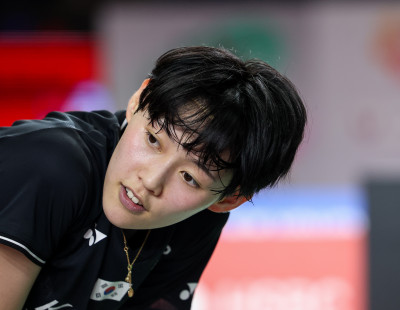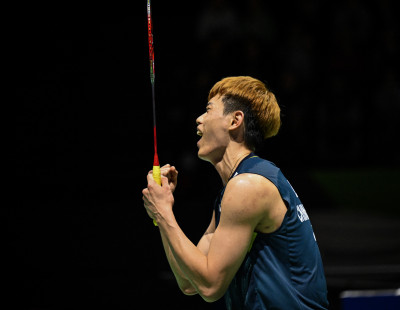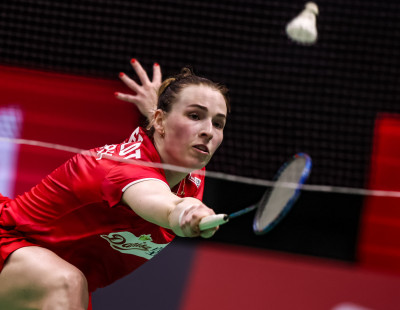The BWF AGM on Saturday 22 May 2021 will discuss and vote on the proposal from Badminton Indonesia and the Maldives Badminton Association to amend the Laws of Badminton relating to the scoring system.
This proposal, seconded by Badminton Asia, Badminton Korea Association and the Chinese Taipei Badminton Association, seeks the implementation of the new scoring system (5×11) on the basis of a number of factors. Here are answers to some Frequently Asked Questions (FAQ) about the proposal:
Why is the scoring system being proposed in May 2021?
The implementation date will be discussed and decided by BWF Council. The system will not be implemented before the Tokyo 2020 Olympic Games, and will likely not be fully implemented before January 2022 to allow players and coaches to practice and prepare themselves properly before the changes are implemented. The implementation date will also now allow players and coaches ample opportunity to become accustomed to the system prior to the start of the Olympic Qualification Period for Paris 2024.
Furthermore, BWF and various service providers related to top-level tournaments will need some time to prepare various technology solutions to ensure the new regulations are properly implemented in tournament presentation.
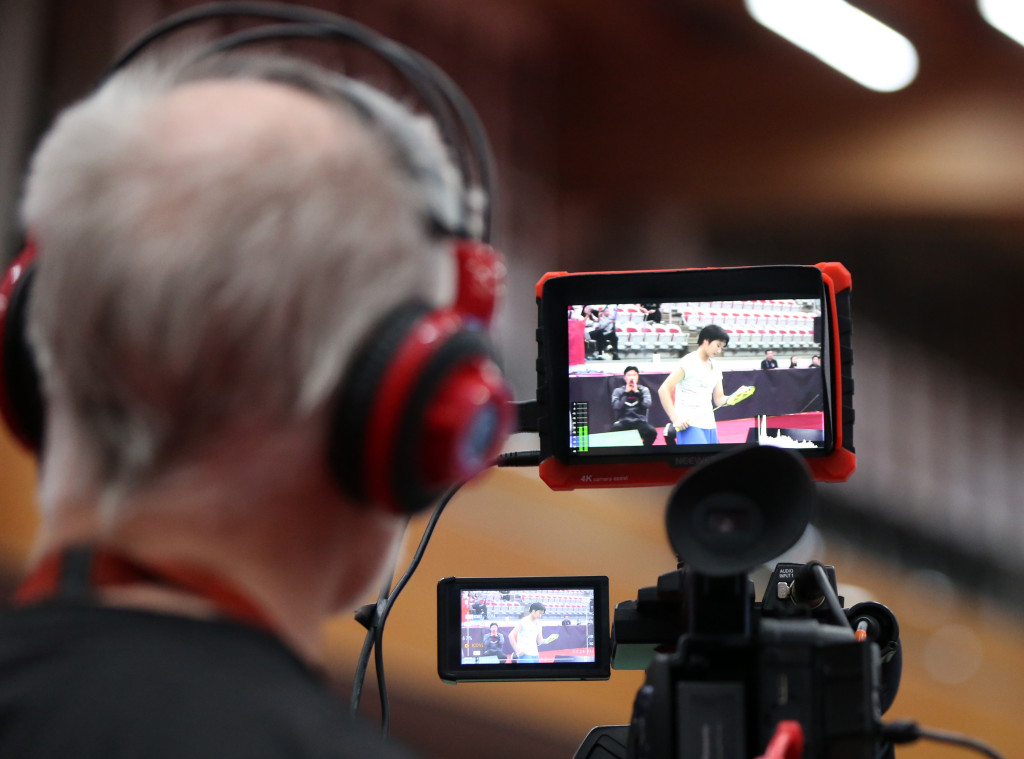
The new scoring system is more television-friendly and marketable.
Are we making too many changes to the sport in a short period of time?
BWF strongly believes the introduction of the new HSBC BWF World Tour in 2018 and new sponsors have provided the ideal opportunity to innovate our sport further. Many of the proposed changes have been in discussion for years and now is the right time to embed these changes prior to the next Olympic Games in 2024 which is our global showcase to potential new fans.
As previously stated, BWF’s Mission is to attract new fans while not compromising the integrity and principles of badminton. Our new commercial partners – including agencies, broadcasters and key sponsors who are integral to the top flight of our sport – expect BWF to innovate more, thereby ensuring our badminton product remains competitive, relevant and popular, and that it continues to grow globally. A standstill approach would be a backward move and other sports may come and take our share of the sports marketplace.
Why do we want to make a fundamental change to our sport when we are in a successful period?

The existing 3×21 system does take a toll on players’ fitness.
The BWF is determined to build on recent successes and keep badminton moving forward in the current fast-paced, cutting-edge world of sport. Change and innovation are vital constants to succeed in an increasingly saturated marketplace and it is important to increase the excitement and engagement in our sport to grow our fan base globally. There are many current examples of traditional and new sports which are constantly looking to upgrade their image and presentation, and badminton needs to change to remain relevant and continue its progress.
In keeping with the Vision embraced in the BWF Strategic Plan 2020-2024: ‘making badminton a leading global sport accessible to all’ and ‘giving every child a chance to play for life’; the BWF Council wishes to propose a suite of initiatives to further elevate badminton within the realm of ‘sportainment’ – the complex and savvy blend of sports and entertainment that is the blueprint for success within the sport-event industry today.
The proposed improvements are designed to elevate the sports presentation of BWF events and badminton in general. They include, in particular, an enhanced scoring system, but the progressive strategy encompasses other initiatives, some of which have already been implemented in recent years. They also ultimately intend to benefit our athletes and our Member Associations. As badminton becomes increasingly popular, the support that we all consume will grow and bear exponential fruits for all involved in the sport.
Will the sport become very attacking and frantic in nature and lose some of its tactical variety and beauty?
The scoring system change in 2006 was a much more fundamental change to our sport, moving to a rally-point system. Many of the same questions and fears were raised at that time: badminton would lose its character, net skills would be eliminated, and the sport would become too attacking and less tactical. None of that happened. Some clearly underestimated our athletes as they were able to adapt to a very fundamental change and move the sport forward as a spectacle, and badminton remained a highly-skilled activity with great variety and different styles of play.
The proposed change is much less fundamental and we are confident our players will adapt quickly to any physical or psychological differences, and that this change will provide an even greater level of excitement and entertainment. BWF has invested in a considerable amount of research into the potential impact of the change and we are confident it will prove beneficial to both the sport and our players.
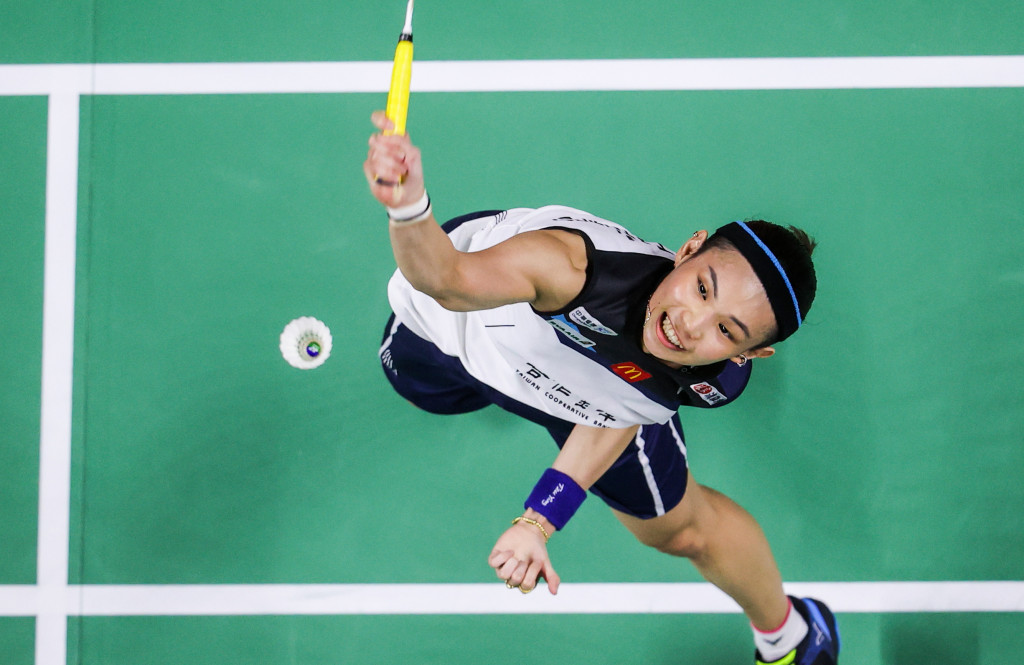
Badminton players have been known to adapt quickly to different situations.
Will it be difficult for players and countries to change their physical preparation to adapt to the new scoring (unknown nature of the consequences of the change)?
Any change to the scoring system will have an impact on the preparation of players for competition. How to score a point in badminton, however, will not change. The length of the match will very likely become slightly shorter but the physical element of the game will remain very much the same. Moreover, many of our Member Associations have access to excellent cutting-edge sports science support and will be able to react to this proposed change swiftly. For the countries which lack these services, BWF will undertake research to establish adapted training protocols which will be made available through our online sports science portal.
The implementation of the scoring system also gives players and coaches time until the beginning of 2022 to practise with the system, and also gives players until May 2023 – when the Paris 2024 Olympic Games Qualification starts – to further get accustomed to playing with the 5×11 scoring format. That said, many players have competed under the new scoring system or very similar systems in various BWF test tournaments or in national leagues.
Will 18 months of the scoring system prior to the start of the Olympic Qualifying period be sufficient?
A major difference between the scoring system proposal in 2018 and 2021 is that there is a much longer preparation time until the start of the next Olympic qualification period – only starting in May 2023. If the proposal is agreed in May 2021, players will have the opportunity to start their preparation for the change prior to the likely January 2022 implementation date. This should give ample time to adjust training and become familiar with the system. The system has furthermore been tested for some time and many have played with this system – or very similar ones – in BWF test tournaments or various leagues. The system is, therefore, not totally new for many players. The players qualifying for the Olympic Games are all highly-skilled athletes who are capable of adapting quickly to change.
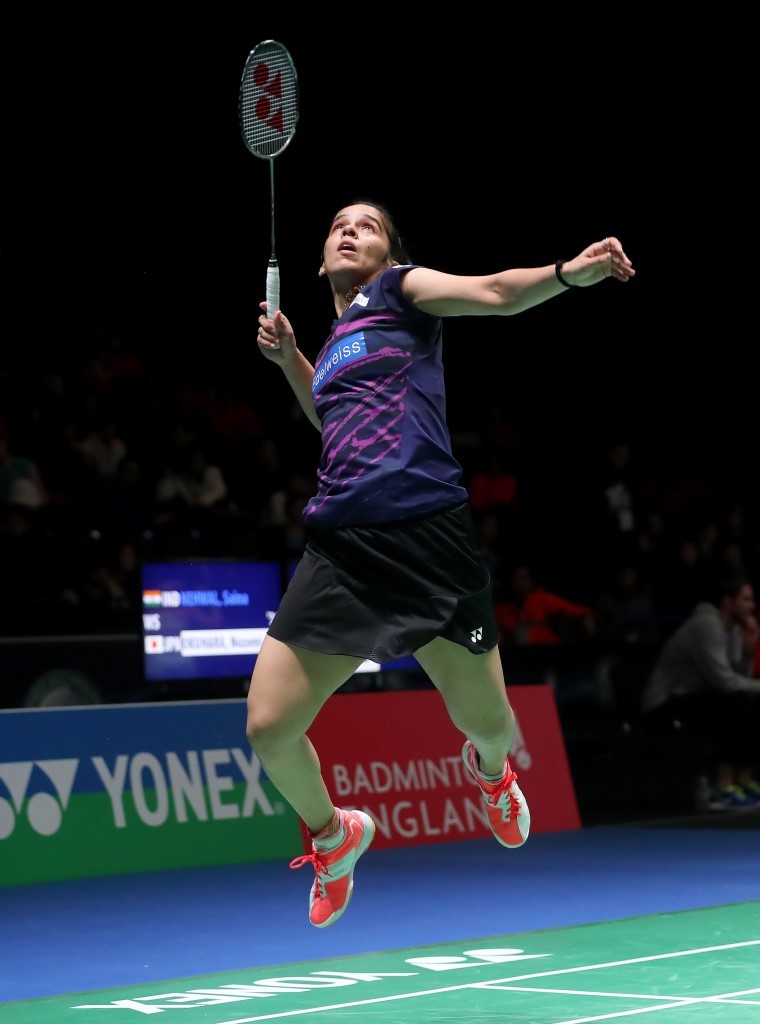
The new scoring system is expected to prolong the career of players.
Have top players been consulted and are they persuaded it is a good change?
Prior to the 2018 proposal, the players were consulted through various questionnaires and feedback received through the BWF Athletes’ Commission. BWF also took note of feedback and remarks from players in the media. It is fair to say that a majority of players were sceptical about the change and have reservations about whether this change is right for badminton. We believe that opinions from players are likely to still be similar, but as the proposal has been placed on the AGM agenda by two Member Associations (and not the BWF Council), there has not been a wider consultation by BWF Council prior to the proposal being submitted. BWF has, however, shared information about the proposal with our top player groups and encouraged Member Associations and players to have close dialogue around the proposed changes to the scoring system.
BWF recognises such sceptical opinions from the players and appreciates that those at the pinnacle of their careers, being the ones directly affected by the change, will have such reservations. It is only natural to resist change when you are a top performer under the current system. We are convinced, however, that the champions of today will also be champions under the newly-proposed system. This change is very unlikely to alter who wins or loses. However, the new scoring system will require players to be even more focused from the start of matches. That should positively influence the excitement in our beloved sport and, in the long term, maintain badminton’s relevance among all target groups – particularly the young generation whose interest we want to secure.
In addition, the BWF Athletes’ Commission has been involved in the Council discussions and decision-making processes – both for the 2018 proposal and leading up to the 2021 AGM.
Will there be a guarantee that more (shorter) games will create more excitement (previous experience showed that games were lost for tactical reasons therefore diffusing any tension in the match)?
BWF has invested heavily in an in-depth statistical analysis of potential new scoring systems designed to create more and quicker key-point situations. The 5×11 system is the preferred option. The rally-point system has clearly been successful but the BWF Council feels further enhancement of badminton is vital at this stage if our sport is to maintain and indeed grow its share of the sports-entertainment landscape.
The key objectives include:
o Building suspense quicker – more intensity in matches.
o Increasing the excitement in matches.
o Slightly shortening the length of matches – to optimise television broadcasts and protect the well-being of players.
Based on the statistical analyses, the test results and the opinion of key stakeholders, we believe the 5×11 system will achieve these objectives.
Will the physical nature of badminton be reduced, thus affecting the spectacular nature of our sport?
Research shows that following the 2006 changes, match lengths have gradually increased, to a level where certain events are reaching the level of the previous system. This demonstrates how players adapt to change. It is clear there was a shift in emphasis from slower-type aerobic fitness, training and play, to more explosive and anaerobic-type preparation, whilst endurance remained a key component. The new system, while reducing match length, is designed to provide more exciting play and important points earlier in matches. This will increase intensity and therefore ensure the physicality of our sport is maintained.
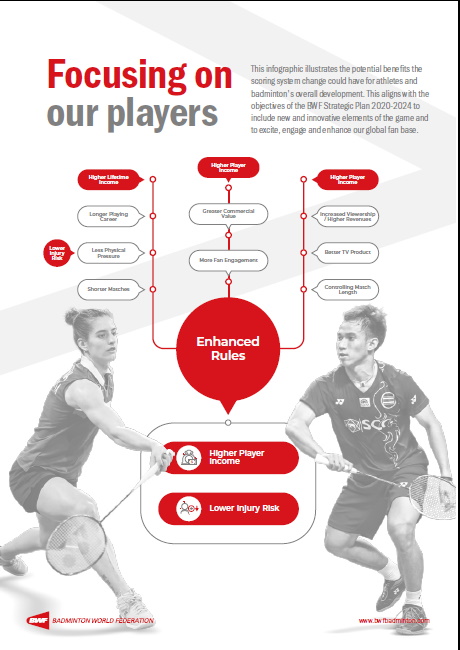 Will the scoring system be mandatory for all levels at national level?
Will the scoring system be mandatory for all levels at national level?
This will be up to our Member Associations. Many domestic leagues and tournaments at national level are already using alternative scoring systems. We anticipate this will continue. The change will come in at BWF-sanctioned events, with the Member
Associations having the flexibility of where, how and if they want to implement the system in their own logistical situations.
The proposed changes include that the existing 3×21 scoring system remains among the alternative scoring systems and can therefore be used. Clearly, it is expected that the new scoring system (5×11 points) will become the main format in the higher levels of national systems. However, as is the case today, different scoring systems (even in some instances the old version of 3×15 points) are still used by various badminton communities.
Would it not be a disadvantage for badminton that different rules are used (scoring, service etc.) at different levels of the sport?
This is a question the BWF Council has discussed intensively as it has traditionally been the preferred approach that one main scoring system exists, and that the main rules would be the same for all levels and ages. That being said, some Member Associations have always introduced variations for different age groups and sometimes different levels to ensure the best possible experience for players. We think this is the right thing to do from a development perspective as well as for organisational reasons.
With the rapid development of international top sports as part of the entertainment industry, the BWF Council has identified the need to ensure that appropriate changes are implemented at the elite level of badminton – even if that means different rules apply to different levels. This is already the case for different technology solutions, such as Instant Review System (Hawk-Eye), where such regulations and systems can only be implemented at the top level of the sport because of costs. But BWF Council equally believes there is room to allow differences and flexibility around other areas of Laws of Badminton also, such as the scoring system and the service rules.




















